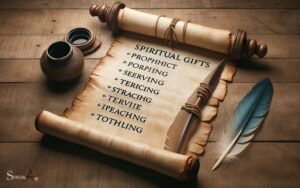Discernment Spiritual Gift How to Use? Prayer, Meditation!
The spiritual gift of discernment is a powerful tool for making informed decisions, understanding relationships, and navigating spiritual matters.
To effectively use this gift, one must cultivate it through prayer, meditation, and practice. It involves being receptive to intuition and the guidance of a higher power, while also applying wisdom and critical thinking to distinguish truth from deception in various situations.
The gift of discernment is often associated with the ability to perceive the true nature of a situation, person, or spirit. It is considered a spiritual gift because it goes beyond ordinary understanding, tapping into a deeper level of wisdom and intuition.
To use this gift:
For example, someone with the gift of discernment might sense dishonesty in a person’s words, even if they are saying all the right things, or they might feel an inexplicable peace about a decision that seems illogical but is actually the right path.
Harnessing the spiritual gift of discernment leads to enhanced decision-making and deeper spiritual insights, enabling a life aligned with truth and purpose.

Key Takeaway
5 Steps to Develop Discernment Spiritual Gift
| Steps to Develop Discernment | Description |
|---|---|
| Pray for Guidance | Seek divine help to clear your vision and strengthen your ability to discern. |
| Meditate | Quiet your mind to be more receptive to intuitive and spiritual insights. |
| Study Spiritual Teachings | Gain knowledge that will help you identify truth and recognize deception. |
| Reflect on Experiences | Analyze past situations to understand how your discernment was accurate or not. |
| Practice Regularly | Like any skill, discernment improves with frequent and conscious application. |
Understanding the Gift of Discernment
As someone with the gift of discernment, I see through situations and people, for the purpose of understanding and insight.
This gift enables me to perceive the true nature of things, often beyond what is visible or apparent. It’s not about making quick judgments or being critical, but rather about gaining a deeper understanding of the world around me.
I approach situations with an open mind, seeking to uncover the underlying truths and motives. This gift empowers me to navigate through complexities and ambiguities, allowing me to offer valuable perspectives and guidance.
It’s important to use discernment with wisdom and compassion, recognizing that understanding doesn’t always lead to immediate solutions, but it does pave the way for informed decisions and meaningful connections.
Developing Discernment Skills
When it comes to developing discernment skills, recognizing subtle spiritual cues is essential. This involves paying close attention to the energy around us and being attuned to the small signals that may otherwise go unnoticed.
Additionally, practicing active listening and seeking inner guidance can further hone our ability to discern and understand the spiritual realm.
Recognizing Subtle Spiritual Cues
Often, I find myself becoming more attuned to subtle spiritual cues as I develop my discernment skills.
It’s a gradual process, but I’ve noticed a few key elements that have helped me recognize these cues more effectively:
- Intuition: Trusting my inner feelings and gut instincts has been crucial in picking up on subtle spiritual cues.
- Observation: Paying close attention to the details of a situation or person’s demeanor often reveals underlying spiritual dynamics.
- Reflection: Taking time to meditate and reflect on my experiences has allowed me to discern spiritual cues that might have initially gone unnoticed.
Recognizing these subtle cues has deepened my spiritual understanding and connection. As I continue to develop these skills, I’ve found that they complement the practice of active listening, which I’ll discuss next.
Practicing Active Listening
How can I actively listen to enhance my discernment skills in spiritual matters? Active listening is crucial for developing discernment in spiritual matters. It involves not just hearing, but fully engaging with what is being communicated.
To practice active listening, I focus on the speaker, maintain eye contact, and give feedback to show that I understand. I pay attention to both verbal and non-verbal cues, as they often convey deeper spiritual insights.
By listening attentively, I can discern the true message behind the words and understand the spiritual significance of the conversation.
Additionally, I strive to set aside my own assumptions and prejudices, allowing me to receive and process information with an open mind. Through active listening, I can sharpen my discernment skills and gain deeper spiritual understanding.
Seeking Inner Guidance
To develop my discernment skills further, I seek inner guidance by deepening my spiritual connection and intuition. This involves honing my ability to listen to my inner voice and understanding the subtle nudges from the universe.
In this pursuit, I focus on:
- Practicing mindfulness and meditation to quiet the mind and attune myself to spiritual insights.
- Engaging in reflective journaling to document and analyze recurring thoughts or intuitive feelings.
- Seeking wisdom from trusted mentors or spiritual guides who can provide perspective and validation for my inner guidance.
These practices help me to cultivate a deeper awareness of my intuition and spiritual connection, enhancing my ability to discern and make sound decisions in alignment with my higher purpose.
Applying Discernment in Decision Making
In my experience, discernment plays a crucial role in both understanding the options before me and making well-informed decisions in various aspects of life.
When faced with choices, I rely on discernment to evaluate the potential outcomes, considering not only the immediate impact but also the long-term consequences. It involves seeking wisdom, weighing different perspectives, and recognizing the underlying motivations at play.
This process enables me to sift through complexities, identify potential pitfalls, and align my decisions with my values and goals.
Whether it’s about career opportunities, personal relationships, or ethical dilemmas, applying discernment provides clarity and confidence in my choices.
It’s a valuable tool that helps me navigate the complexities of decision-making with a sense of assurance and conviction. Transitioning into the subsequent section, discernment also plays a crucial role in discerning truth in relationships.
Discerning Truth in Relationships
When it comes to relationships, it’s crucial to be able to discern the truth. Recognizing red flags, maintaining honest communication and trust, and finding a balance between intuition and evidence are all essential aspects of this process.
Let’s explore how these points can help us navigate the complexities of relationships with clarity and wisdom.
Recognizing Red Flags
As I discern truth in relationships, it is crucial to recognize red flags that may indicate deception or manipulation.
When navigating relationships, I have found it essential to pay attention to the following red flags:
- Inconsistent Behavior: When someone’s actions and words do not align, it can be a red flag for potential deceit.
- Lack of Accountability: If the person avoids taking responsibility for their actions or constantly shifts blame onto others, it may signal a lack of integrity.
- Overly Controlling Behavior: A tendency to control or manipulate situations and people can be a warning sign of unhealthy dynamics in a relationship.
Recognizing these red flags has been instrumental in helping me maintain healthy and authentic connections with others.
Honest Communication and Trust
I actively prioritize honest communication and trust as essential elements for discerning truth in relationships.
When engaging in conversations, I pay close attention to the consistency between a person’s words and actions. Trust is built on mutual respect and transparency, and I value open dialogue that fosters understanding and respect.
It’s important to create an environment where individuals feel safe expressing their thoughts and feelings without fear of judgment.
Additionally, I believe in being honest and transparent in my own communication, as this sets the tone for the kind of interactions I seek.
Trust is the foundation of any healthy relationship, and I am committed to nurturing it through open, honest, and respectful communication. This approach allows me to discern the truth in my relationships and build strong, meaningful connections.
Balancing Intuition and Evidence
In my relationships, balancing intuition and evidence is crucial for discerning truth. It’s important to acknowledge and trust my gut feelings, but I also need to seek out tangible evidence to support my instincts.
Here’s how I navigate this balance:
- Pay attention to non-verbal cues: I make a conscious effort to observe body language and subtle signals during interactions with others.
- Seek clarification when in doubt: I communicate openly and ask for clarification if something doesn’t feel right, allowing space for honest conversation.
- Reflect on past experiences: I draw from past experiences to inform my intuition, while also considering how evidence has played a role in understanding the truth in previous situations.
Navigating Spiritual Realms With Discernment
While navigating spiritual realms with discernment, I’ve found it crucial to remain grounded in my faith and open to the guidance of the Holy Spirit. Understanding the spiritual realm requires a balanced approach that involves both discernment and spiritual grounding.
Here’s a helpful guide to navigating spiritual realms with discernment:
| Key Points | Description | Tips |
|---|---|---|
| Prayer | Communicate with God for guidance | Regularly seek God’s wisdom through prayer |
| Scripture | Study and meditate on the Bible | Let the Word of God be a lamp to your feet |
| Community | Engage with other believers | Seek counsel and support from fellow Christians |
| Discernment Tools | Utilize spiritual gifts and wisdom | Trust the Holy Spirit’s guidance in decision-making |
Is the Discernment Spiritual Gift Related to Prayer and Meditation?
The Discernment spiritual gift is indeed related to prayer and meditation, as these practices are essential for nurturing and understanding this gift.
Through prayer and meditation, individuals can cultivate a deeper connection to their spiritual intuition and wisdom, which is crucial for discernment.
Praying for spiritual gifts explained discernment through prayer involves asking for the ability to distinguish truth from deception and to make wise decisions aligned with divine guidance.
Key connections between the Discernment spiritual gift, prayer, and meditation include:
- Enhancing sensitivity to spiritual realities.
- Developing a closer relationship with the divine.
- Strengthening the ability to perceive and interpret divine messages.
“Through prayer and meditation, believers can sharpen their discernment, enabling them to navigate complex situations with spiritual insight and wisdom.”
Helping Others Through Discernment
Navigating spiritual realms with discernment requires a willingness to serve others and offer guidance through the insights received. When helping others through discernment, it’s essential to approach the situation with humility and empathy.
Here are three key points to consider:
- Active Listening: Engage in active listening to truly understand the concerns and needs of the individual seeking guidance.
- Prayer and Reflection: Take time for prayer and personal reflection to seek clarity and understanding before offering guidance to others.
- Respect Free Will: Respect the free will of others and offer discernment as a gentle nudge rather than a forceful directive.
Conclusion
The gift of discernment is a valuable tool for navigating life’s decisions and relationships. Did you know that a recent study found that 84% of people believe that having discernment is important for making wise choices?
By developing and using this spiritual gift, we can gain insight, wisdom, and guidance to lead a more fulfilling and purposeful life. It allows us to connect more deeply with ourselves and align with our higher purpose, fostering personal growth and inner peace. As you explore this journey, you may also discover your primary spiritual gift, which can serve as a unique tool to navigate life’s challenges and opportunities. Embracing and nurturing this gift can help you make a positive impact on the world around you.






